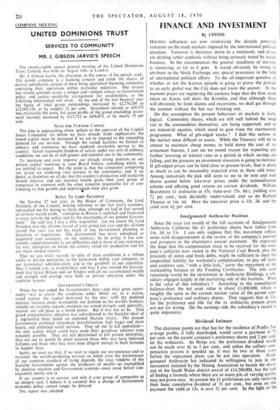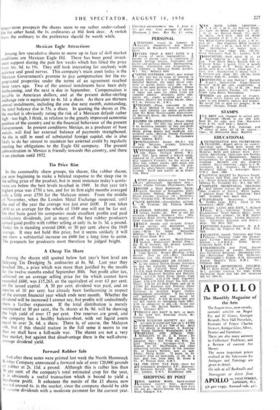FINANCE AND INVESTMENT
By CUSTOS
HOLIDAY influences are now reinforcing the already powerful restraints on the stock markets imposed by the international political situation. Turnover is therefore down to a minimum, and prices are drifting rather aimlessly without being seriously tested by actual business. In the circumstances the general steadiness of markets is reassuring, so far as it goes. It would obviously be wrong to attribute to the Stock Exchange any special prescience in the field of international political affairs. To the all-important question of whether or not the Korean episode is going to prove the prelude to an early global war the City does not know the answer. At the moment prices are registering the cautious hope that the firm stand taken on Korea will deter the Kremlin, and that although there will obviously be fresh alarms and excursions, we shall get through the summer without the hot war breaking out.
On this assumption the present behaviour of markets is fairly logical. Commodity shares, which are still well behind the steep rise in the commodities themselves, are being supported, and so are industrial equities, which stand to gain from the rearmament programme. What of gilt-edged stocks ? I find this section of the market most difficult to assess. While the Treasury will do its utmost to maintain cheap money to hold down the cost of re- armament finance, I can see no sound reason for expecting any further lowering of interest rates in a period in which savings are falling, and the pressure on investment resources is going to increase. If gilt-edged prices can be held close to present levels, that is about as much as can be reasonably expected even in these odd times. Among industrials the pick still seem to me to be iron and steel shares quoted below take-over prices under the nationalisation scheme and offering good returns on current dividends. William Beardmore £1 ordinaries at 47s. (take-over 53s. 8d.), yielding over 7+ per cent., look decidedly under-valued, and so do Richard Thomas at 14s. 6d. Here the take-over price is 15s. 3d. and the yield over 6+ per cent.
Amalgamated Anthracite Position
Since the issue last month of the full accounts of Amalgamated Anthracite Collieries the £1 preference shares have fallen from 14s. 3d. to 13s. I can only suppose that this movement reflects some mild disappointment at the review of the company's position and prospects in the chairman's annual statement. He expressed the hope that the compensation stock to be received for the com- pany's collieries now vested in the National Coal Board, plus the proceeds of stores and book debts, might be sufficient to meet the unspecified liability for workmen's compensation, to pay off loans and creditors and, " with a little luck," cover the repayment of the outstanding balance of the Funding Certificates. The sole asset remaining would be the investment in Anthracite Holdings, a sub- sidiary engaged largely in the marketing side of the business. What is the value of this subsidiary ? According to the consolidated
balance-sheet the net asset value is about £1,800,000, which is roughly the same as the current market value of the parent com- pany's preference and ordinary shares. That suggests that at 13s. for the preference and 10d. for the ls. ordinaries present prices are not far wrong. On the earnings side the subsidiary's record is quite impressive.
Dividend Estimate
The chairman points out that but for the incidence of Profits Tax average profits, if fully distributed, would cover a payment of 71 per cent, on the parent company's preference shares and 2 per cent. on the ordinaries. As things are, the preference dividend would not be much over 4-1- to 5 per cent., and unless the colliery com- pensation process is speeded up, it may be two or three years before the repayment plans can be put into operation. Amal- gamated Anthracite has indicated its willingness to join in any movement initiated by the Mining Association to hasten the share- out of the South Wales district award of £14,200,000, but the task of finding a formula where there are so many pits of varying quality may not prove easy. At present the £1 preferences are only receiving their basic cumulative dividend of 31 per cent., but even on this payment the yield. at 13s. is over. 5+ per cent. In the light of the Ringer-term prospects the shares seem to me rather under-valued. On the other hand, the is. ordinaries at 10d. look dear. A switch from the ordinary to the preference should be worth while.
Mexican Eagle Attractions Among few speculative shares to move up in face of dull market conditions are Mexican Eagle Oil. There has been good invest- ment support during the past few weeks which has lifted the price from 16s. 9d. to 19s. They still look interesting for anybody with patience and good nerves. This company's main asset today is the Mexican Government's promise to pay compensation for the ex- propriated properties under the terms of an agreement reached three years ago. Two of the annual instalments have been duly forthcoming, and the next is due in September. Compensation is payable in American dollars, and at the present dollar-sterling exchange rate is equivalent to 4s. Id. a share. As there are thirteen annual instalments, including the one due next month, outstanding, the total balance due is 53s. a share. in quoting the shares at 19s. the market is obviously rating the risk of a Mexican default rather high-too high, I think, in relation to the greatly improved economic position of the country and to the financial behaviour of the present Government. In present conditions Mexico, as a producer of base metals, will find her external balance of payments strengthened. As she is still in need of substantial foreign capital, she is also likely to do her utmost to maintain her external credit by regularly meeting her obligations to the Eagle Oil company. The present administration in Mexico is friendly towards this country, and there is no election until 1952.
Tin Price Rise In the commodity share groups, tin shares, like rubber shares, are now beginning to make a belated response to the steep rise in the selling price of the product, but in most instances today's quota- tions are below the best levels touched in 1949. In that year tin's highest price was £750 a ton, and for its first eight months averaged only a little over £550 for the Malayan mines. From the middle of November, when the London Metal Exchange reopened, until the end of the year the average was just over £600. If one takes f600 as an average for the whole of 1949 one will not be far out. On that basis good tin companies made excellent profits and paid satisfactory dividends, just as many of the best rubber producers earned good profits with rubber selling at only Is. to Is. 3d. a pound. Today tin is standing around £800, or 30 per cent. above the 1949 average. It may not hold this price, but it seems unlikely it will not show a substantial increase on f600 for a long time to come. The prospects for producers must therefore be judged bright.
A Cheap Tin Share Among the shares still quoted below last year's best level are Selayang Tin Dredging 5s. ordinaries at 8s. 9d. Last year they touched 10s., a price which was more than justified by the results for the twelve months ended September 30th. Net profit after tax, achieved on an average selling price for tin which cannot have exceeded £600, was £15,263, or the equivalent of over 63 per cent. On the issued capital. A 30 per cent. dividend was paid, and an interim of 10 per cent, has already been forthcoming in respect of the current financial year which ends next month. Whether the dividend will be increased I cannot say, but profits will undoubtedly show a further expansion. If the total distribution is merely maintained at 30 per cent., the 5s. shares at 8s. 9d. will be showing the high yield of over 17 per cent. Ore reserves are good, and the company has a healthy balance-sheet, with net liquid assets equal to over 2s. 6d. a share. There is, of course, the Malayan risk, but if this should mature in the full sense it seems to me that we shall have a full-scale war. The shares are not a very free market, but against that disadvantage there is the well-above- average dividend yield.
Forward Rubber Sale Just after these notes were printed last week the North Hummock Rubber Company announced a forward sale of over 120,000 pounds of rubber at 2s. 11d. a pound. Although this is rather less than is cent. of the company's total estimated crop for the year, it Is obviously a useful transaction which is bound to yield a handsome profit. It enhances the merits of the fl shares now (Pit ted around 6s. in the market, since the company should be able to, icsume dividends with a moderate payment for the. current year.



































 Previous page
Previous page